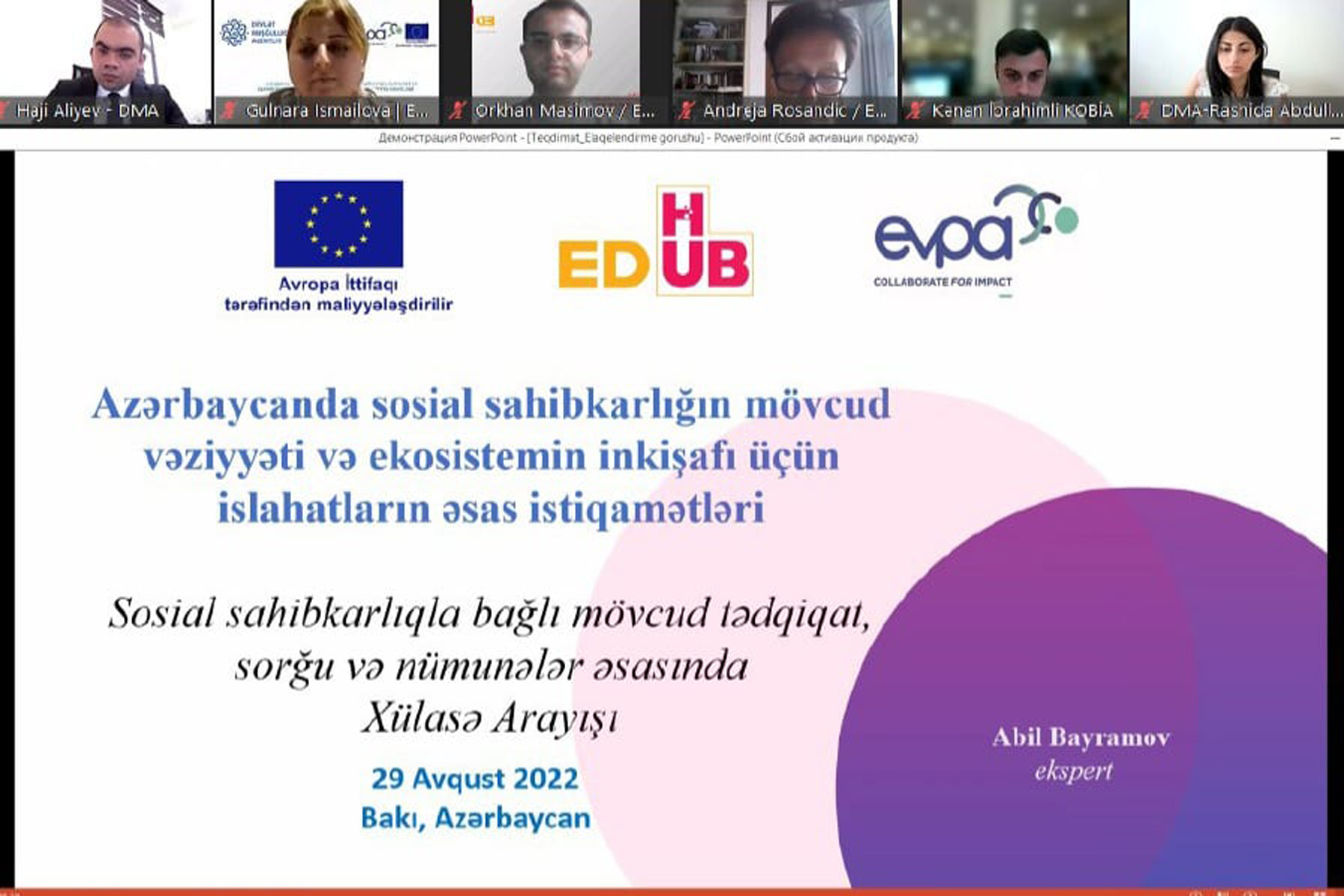On August 29, a Coordination meeting dedicated to “The current situation of Social Entrepreneurship in Azerbaijan and the main directions of reforms for the development of the ecosystem” topic was held.
EduHUB expert Abil Bayramov presented the results of the study on the Social Entrepreneurship ecosystem in Azerbaijan highlighting interesting facts such as that most social enterprises (about 64%) trade only in local markets and their most important customers are local people (80%) and local companies (56%) as well as that most were still traditional businesses and not digital businesses or startups.
The meeting was attended by stakeholders from governmental institutions, Social Entrepreneurship working group and international organisations. The member of Azerbaijan Parliament Mushfig Jafarov highlighed importance of this study and shared government priorities in coming year.
Below you can read a summary of the results presented:
Current situation regarding Social Entrepreneurship enterprises
- Enterprises engaged in social entrepreneurship are young (founded in the last 6 years) and most of them are located in Baku.
- Most social enterprises operate with a small team of up to 6 people.
- The main initiatives in the field of social entrepreneurship belong to women, women are more active and may have an advantage in both employees and management staff.
- The structure of most of them is commercially oriented (individual entrepreneur or LLC), some of them are not officially registered. Among them, the number of those who make profit and work with losses is almost the same, the share of those who do not make profit, but do not work with losses, is relatively high.
- The majority of social enterprises (95%) had a sales revenue of up to 25,000 euros.
- Enterprises’ revenue model is production and sales. Companies earn income by selling the products they produce. Most of them derive a large part of their income (about 75%) from trading activities.
- Most are traditional businesses, not digital businesses or startups.
- Most (about 64%) trade only in local markets and their most important customers are local people (80%) and local companies (56%).
- Their activity is mainly focused on the following directions: promotion of healthy life and well-being; promotion of productive employment and decent work; meeting the needs of persons with disabilities and persons in need of special care; reducing inequality; gender equality.
- Many of them feel the need for investment support, government support and corporate support.
Education and capacity building
- Raising awareness about social entrepreneurship, popularizing the idea through mass media and social networks. Having a targeted government program for this can have more effective results.
- Creation of Internet resources containing information and research on social entrepreneurship. This can be achieved by creating a separate website or by supporting an existing website.
- Implementation of special programs for increasing the skills of social entrepreneurs. In this regard, the experience of the Social Entrepreneurship Development Agency of South Korea can be used. The agency implements various programs in the direction of skill development. For example, the Social Enterprise Academy in South Korea is one of the many programs offered by the Social Entrepreneurship Development Agency in Skills Development and Human Capital. The Academy conducts trainings to improve management skills of social entrepreneurs.
Improvement of legislation
- Determining the concept of social entrepreneurship and social enterprise criteria in legislation. The concept of “social entrepreneurship” should be defined in the law, exact criteria should be developed for this or that subject to be considered a social entrepreneur (social enterprise), requirements for each direction of activity in the legislation, etc. should be reflected.
- Certification of social enterprises. Certification of enterprises that meet the criteria and requirements established by legislation to obtain the status of social enterprises can allow their identification without any additional procedures.
- Determination of benefits for social entrepreneurs (loans, land lease, payment of utilities), including tax benefits.
Financing
- Creation of new financial instruments, including co-financing model. For example, in foreign practice, grants are used to strengthen the capacities and skills of participants by creating knowledge and innovation in innovative ecosystems.
- Facilitating access to credit for social enterprises. In order to increase access to preferential loans provided by the Entrepreneurship Development Fund, it is important to ensure that social entrepreneurship companies are included in the preferential group.
- Establishment of social investment funds. Supporting a social entrepreneurship entrepreneur through a fund can be one of the means to improve access to financial resources.
Supporting social entrepreneurship
- Creation of special institutions to support social entrepreneurship. As one of such institutions, the Social Entrepreneurship Development Support Fund can be established.
- Inclusion of goals and appropriate measures for the development of social entrepreneurship in state programs, road maps or adoption of separate programs.
- Creating more favorable opportunities for social entrepreneurs to participate in public procurement. The government can use the public procurement system for the demand and consumption of social innovations.
- Implementation of special programs for increasing the skills of social entrepreneurs.
Collaboration and networking
- Strengthening social entrepreneurship-state-private sector cooperation. In addition to specific means, strong coordination and institutional measures are often necessary.
- Networking of social entrepreneurship subjects. Networking can ensure more efficient action for coordinating initiatives, joint efforts for positive change, capacity building, awareness raising and other goals.
The event was organized by Education HUB with close cooperation with State Employment Agency within the framework of the “Collaborate for Impact” program of the European Venture Philanthropy Association. The program is implemented with the financial support of the European Union, and the official partner in Azerbaijan is Education HUB.

